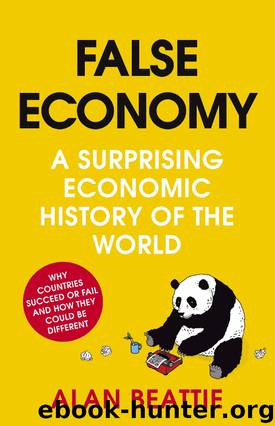False Economy by Alan Beattie

Author:Alan Beattie
Format: epub
Chapter 6. Politics Of Development: Why Does Our Asparagus Come From Peru?
If you are a European, or less so an American, take a look at your supermarket the next time you go shopping. If you live in an area where there is a consistent demand for fresh green asparagus, the chances are that—outside a short growing season in Europe and a slightly longer one in the United States—the asparagus on display will have been flown from Peru.
Even allowing for the fact that fruit, vegetables, and flowers are regularly flown from tropical countries to temperate ones, it may strike you as odd that, particularly in Europe, a cost-effective industry spontaneously emerged to airlift a perishable green vegetable thousands of miles around the world from the remote western coast of Latin America. Your wonder would not be misplaced.
The development of the world economy may look like an onward march of impersonal market forces, laying all inefficiencies to waste before it. In truth, as we saw in the chapter on water, some industries, but especially agriculture, are shaped as much by politics as by economics. Their sustenance owes much to the fact that small groups of producers who will throw everything into protecting their livelihoods can often win out over much larger interests who care much less.
Sometimes the initial support may make economic sense, but protection continues well after the original rationale has gone. Eventually, the cabals of producers often lose. But if we look at the various rises and falls of textile, sugar, and banana producers, as we will in this chapter, we'll see that the process can take centuries.
And even when they are defeated, it is generally not because society as a whole has grown tired of the cost of cosseting them but because another, better-organized group of producers has come along to beat them in the lobbying game.
In the case of asparagus, the political imperative that first filled European and American supermarkets with the products of Peru is the desire to get kids off drugs, or at least publicly be seen to be trying. Peru, along with other Andean countries, got a special trade deal in 1991 to give its farmers something to do other than grow coca to make cocaine. In the United States, within the same landmass as the Andean cocaine industry, the Peruvian asparagus industry benefited not only from lower tariffs (import taxes) to the United States but also from tens of millions of dollars a year in financial help from the U.S. government. Asparagus is a high-value vegetable suitable for airfreighting, and Peru's farmers seized the opportunity. Exports to the United States and to the EU, which granted similar access to its markets, rocketed.
In vain do the asparagus growers of California, Washington state, and Michigan complain that they are being driven out of business by favored imports from Peru—mainly produced, the farmers argue, in coastal areas well away from the mountainous coca-growing regions. There aren't enough of them; they have the misfortune to come from states
Download
This site does not store any files on its server. We only index and link to content provided by other sites. Please contact the content providers to delete copyright contents if any and email us, we'll remove relevant links or contents immediately.
International Integration of the Brazilian Economy by Elias C. Grivoyannis(111059)
The Radium Girls by Kate Moore(12028)
Turbulence by E. J. Noyes(8049)
Nudge - Improving Decisions about Health, Wealth, and Happiness by Thaler Sunstein(7706)
The Black Swan by Nassim Nicholas Taleb(7129)
Rich Dad Poor Dad by Robert T. Kiyosaki(6632)
Pioneering Portfolio Management by David F. Swensen(6300)
Man-made Catastrophes and Risk Information Concealment by Dmitry Chernov & Didier Sornette(6019)
Zero to One by Peter Thiel(5801)
Secrecy World by Jake Bernstein(4753)
Millionaire: The Philanderer, Gambler, and Duelist Who Invented Modern Finance by Janet Gleeson(4478)
The Age of Surveillance Capitalism by Shoshana Zuboff(4292)
Skin in the Game by Nassim Nicholas Taleb(4248)
The Money Culture by Michael Lewis(4207)
Bullshit Jobs by David Graeber(4190)
Skin in the Game: Hidden Asymmetries in Daily Life by Nassim Nicholas Taleb(4006)
The Dhandho Investor by Mohnish Pabrai(3764)
The Wisdom of Finance by Mihir Desai(3746)
Blockchain Basics by Daniel Drescher(3582)
